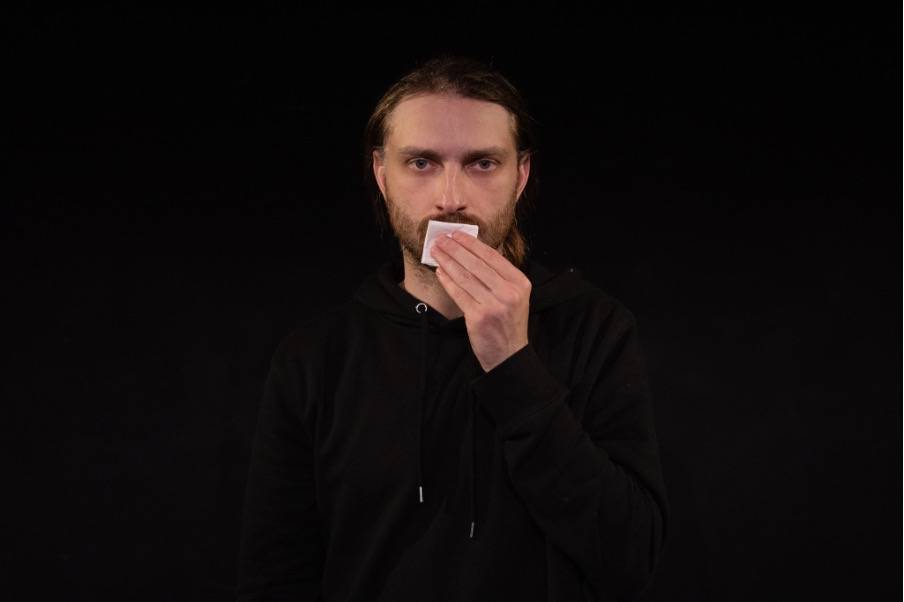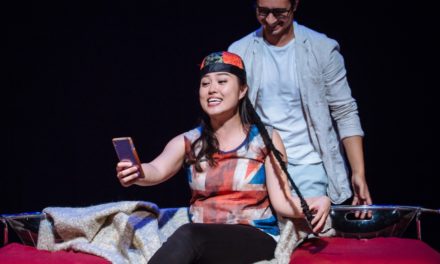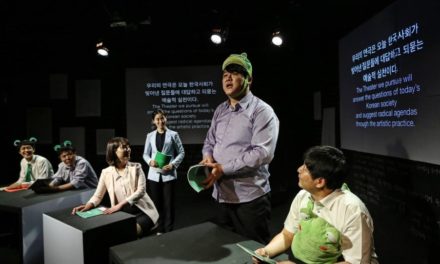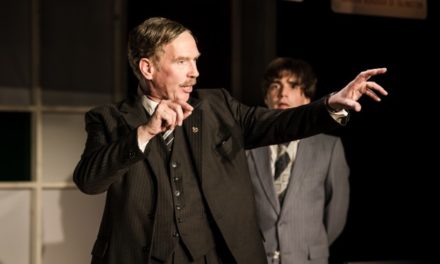Vanya is alive; Vanya is alive and healthy; Vanya is alive and healthy and totally free. And we are safe because we keep silent.
On 27 July a small group of theatre-goers at Camden’s People’s Theatre were offered a glimpse into a Russia otherwise shrouded in fog. Natalia Lizorkina’s Vanya is Alive is both a play and witness statement, and through a feat of double-speak gives voice to a nation’s ongoing resistance.
Though formally a one-man show – brilliantly portrayed by Nikolay ‘Kolya’ Mulakov, of Moscow’s theatre.Doc – a range of characters are on display, each forced by a ‘system’ (it is never specified which regime) to speak in euphemisms and in negation. Over a swift 45 minutes, Mulakov moves across vignettes that deliver conversations between the protagonist – Vanya’s mother, Alevtina (‘Alya’) – and other residents: a neighbor, a shopkeeper, the officials, Vanya’s friend, a hungry woman, and her children, a police officer, the prosecution, prisoners. As for Vanya, he does not appear. The context suggests he is a young drafted soldier, but it is up to the audience to connect these dots.
The eponymous character is therefore conspicuously absent, and perhaps this is precisely the point: in this provocative new production directed by Ivanka Polchenko and produced by Cie OESAP [L’Oeil épissé sur âme pure], absence acts as protagonist and words relay their logical inverse. There is therefore an eerie undertone to the ongoing refrain: ‘My son is absolutely free.’ These are the words of Vanya’s mother, shared with various characters as they absent themselves from her presence. ‘He is well-fed and healthy.’ Indeed.
Following the declaration of Vanya’s ‘freedom’, Alya goes to the streets to celebrate (or is it to mourn?), taking with her an image of a laughing (read: crying) icon. ‘It means something!’ declares a lady, ‘it’s a protest!’ This orthodox symbol, recontextualized into a protest object, finds its mirror in the Constitution, which Vanya’s friend ‘does not’ give Alya, and Alya ‘does not’ read.[1]
No props appear in this production, so the audience is entirely dependent on Kolya’s descriptions. And it is to the playwright’s credit that whether or not Alya is protesting is never made clear. All that matters is that she appears to do so. And it follows: Alya is not carried off by a police officer. She does not receive a jail sentence. She is not beaten.
That Vanya’s voice is never heard, even in indirect speech, is of note. This is a play that by design employs silence to speak of the underground resistance in Russia. In the immediate aftermath of Russia’s invasion of Ukraine, an anti-war petition garnered 17,000 signatures from cultural workers. Institutions made public anti-war statements, and some shut down in protest, while artists, loathe supporting any veneer of normalcy, self-muted, declaring that ‘there is no place for art when civilians are dying under the fire of missiles, when citizens of Ukraine are hiding in shelters, when Russian protesters are getting silenced.’[2]
Within three days, this anti-war chorus was declared a ‘betrayal of the people.’[3] Assistance to foreign states, organizations, and representatives was categorized as ‘high treason against the motherland’ and punished by 20 years in prison.[4] By 4 March 2022 ‘war censorship’ was established, causing an exodus of independent media outlets. By 9 March 15,000 people had been arrested. This figure is believed to be an underestimate. Jail time was doled out to those who the authorities knew had not committed the crime they’d been accused of. Anti-war signs shrank underground, its evidence ever harder to see. These consequences are all explored here by Cie, with the caveat that none can ever be referenced explicitly. We, the audience, are asked to perceive – listen – differently.
Let it be said, then, that Vanya is Alive is a brave play. It is brave from the obvious perspective, in that it voices dissent that, were it to reverberate in its country of origin, would likely result in a jail sentence.[5] But it is also brave within a Western context, where even the hint of compassion for these protesting citizens is seen as tacit approval of an invasion none of them chose. This is theatre at its best – a lone voice in the dark, moving against the tide.
Vanya is Alive plays at Edinburgh Fringe 4-12 August at the Space @ Symposium Hall, Annex. Link for Tickets.
Kitty Brandon-James is a doctoral candidate at UCL SSEES, writing on contemporary art in Russia. Profile.
Alma Prelec is a doctoral candidate at the Royal Central School of Speech and Drama, writing on Spanish and Yugoslav theatre of civil war. Profile.
[1] Article 29 part 5: Censorship shall be banned. Article 31: Russian Citizens shall have the right to assemble peacefully.
[2] Joint statement from Kirill Savchenkov and Alexandra Sukhareva, selected artists for the Russian Pavilion at the Venice Biennale, 2022, announcing their withdrawal. February 2022.
[3] On 27th February 2022 Vyacheslav Volodin chairman of the State Duma, declared anti-war sentiment a ‘betrayal of the people’
[4] On 27th February 2022 Interfax reported: ‘The provision of financial, logistical, advisory or other assistance to a foreign state, an international or foreign organization or their representatives in activities directed against the security of the Russian Federation, contains signs of a crime under Article 275 of the Russian Criminal Code (high treason),’ This crime is penalized by up to 20 years of imprisonment.
[5] See, for example, the case of director Evgenia Berkovich and playwright Svetlana Petriychuk, who were arrested and accused of ‘justifying terrorism’ in their play Finist, the Brave Falcon in May 2023.
This post was written by the author in their personal capacity.The opinions expressed in this article are the author’s own and do not reflect the view of The Theatre Times, their staff or collaborators.
This post was written by Kitty Brandon-James & Alma Prelec.
The views expressed here belong to the author and do not necessarily reflect our views and opinions.


















